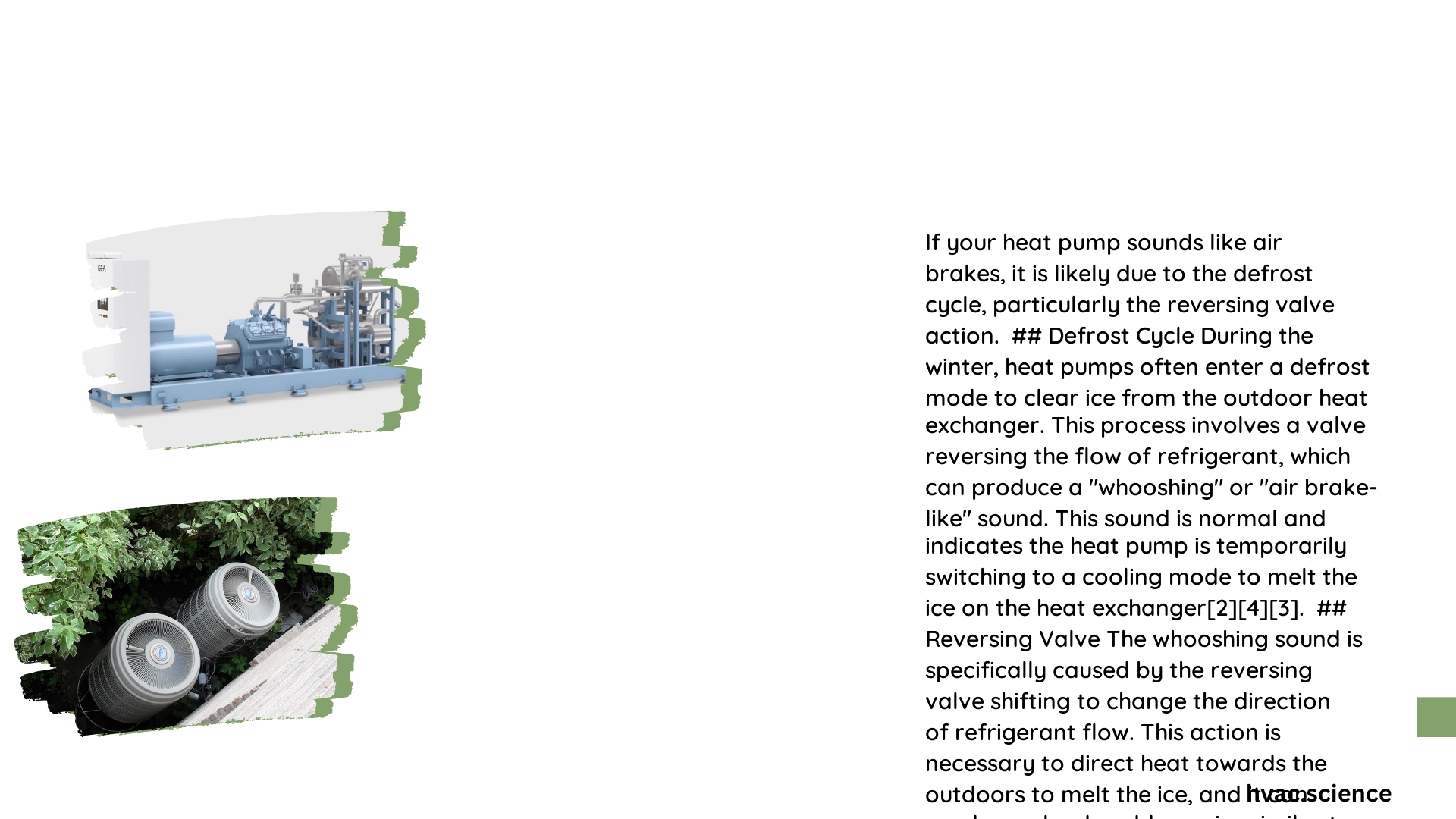Heat pumps producing sounds similar to air brakes can be concerning for homeowners. These noises often indicate underlying issues within the system, ranging from mechanical problems to refrigerant flow issues. Understanding the causes, identifying the specific type of noise, and knowing when to seek professional help are crucial for maintaining your heat pump’s efficiency and longevity.
What Causes a Heat Pump to Sound Like Air Brakes?
Heat pumps typically don’t produce sounds exactly like air brakes. However, certain malfunctions can create noises that might be described as similar to air brakes. These sounds are usually indicative of specific problems within the heat pump system:
- Mechanical Issues
- Refrigerant Flow Problems
- Expansion Valve Malfunctions
Let’s explore each of these potential causes in detail.
How Do Mechanical Issues Contribute to Air Brake-Like Sounds?
Mechanical problems are often the primary culprits behind unusual noises in heat pumps. These issues can manifest in various ways:
-
Grinding or Clanking: These sounds may result from problems with the motor or blower wheel. Wear and tear can lead to loose components or a misaligned blower wheel, producing noises that might be mistaken for air brakes.
-
Rattling or Vibration: Loose or damaged components, such as screws, bolts, or debris caught in the fan blades, can create rattling or vibrating noises. These sounds, while not exactly like air brakes, might be described as such by some homeowners.
What Role Do Refrigerant Flow Problems Play in Unusual Heat Pump Sounds?
Refrigerant flow issues can also lead to sounds that might be likened to air brakes:
-
Hissing or Bubbling: These noises often indicate a refrigerant leak. Uneven refrigerant flow can produce sounds that some might describe as similar to air brakes. It’s important to note that a refrigerant leak not only affects the system’s efficiency but also poses environmental hazards.
-
Gurgling: This sound typically occurs due to the movement of refrigerant through the system, especially when there’s an uneven flow or air trapped in the lines. This can happen due to a refrigerant leak or low refrigerant levels.
Can Expansion Valve Malfunctions Cause Air Brake-Like Sounds?
While expansion valve issues can lead to unusual noises in heat pumps, they are less likely to produce sounds specifically resembling air brakes. However, they can contribute to overall system inefficiency and may exacerbate other issues that do cause unusual noises.
How Can You Troubleshoot Heat Pump Sounds Like Air Brakes?

When faced with unusual noises from your heat pump, follow these troubleshooting steps:
-
Identify the Noise: Determine the exact nature and location of the sound. Is it hissing, grinding, rattling, or another type of noise?
-
Check for Refrigerant Leaks: Use a refrigerant leak detector to identify any leaks. If found, contact a professional technician for repair.
-
Inspect Mechanical Components: Examine the motor, blower wheel, and fan blades for signs of wear, misalignment, or debris. Tighten loose components and clean or replace damaged parts.
-
Check Electrical Components: If the noise is related to clicking or buzzing, inspect the relay or electrical components. Ensure all connections are secure and there are no signs of wear or damage.
-
Perform Regular Maintenance: Regularly clean the coils, check for loose components, and lubricate moving parts to prevent future issues.
What Tools Are Needed for Troubleshooting?
To effectively troubleshoot your heat pump, you’ll need the following tools:
- Multimeter
- Refrigerant leak detector
- Screwdrivers and wrenches
- Safety gloves and goggles
How Long Does Troubleshooting and Repair Take?
Here are some time estimates for common troubleshooting and repair tasks:
| Task | Estimated Time |
|---|---|
| Initial inspection | 15-30 minutes |
| Repairing refrigerant leaks | 1-3 hours (depending on complexity) |
| Replacing mechanical components | 1-2 hours |
What Are Normal vs. Abnormal Heat Pump Sounds?
Understanding the difference between normal and abnormal heat pump sounds is crucial for proper maintenance:
What Are Normal Heat Pump Sounds?
- Humming or Whirring: These sounds indicate the compressor and fans are operating correctly.
- Clicking: Light clicking noises when the system starts or stops a cycle are normal.
- Whooshing: During defrost mode, a whooshing sound is normal as the valve reverses the unit from heating to defrost mode.
What Are Abnormal Heat Pump Sounds?
- Hissing or Bubbling: Indicates a refrigerant leak.
- Grinding or Clanking: Suggests issues with the motor or blower wheel.
- Rattling or Vibration: Indicates loose or damaged components.
- Screeching or Squealing: Points to problems with the fan motor or fan blades.
How Loud Should a Heat Pump Be?
While there are no specific decibel levels provided for heat pump sounds that directly compare to air brakes, here are some general guidelines:
- Normal Operation: Heat pumps typically operate within a range of 40-70 decibels, which is relatively quiet compared to other HVAC systems.
- Abnormal Noises: Loud or unusual noises, such as grinding, clanking, or screeching, can exceed 80 decibels and indicate a problem.
How Can You Prevent Heat Pump Sounds Like Air Brakes?
To prevent your heat pump from developing issues that lead to unusual noises:
- Schedule regular professional maintenance
- Keep the area around the outdoor unit clear of debris
- Change or clean filters regularly
- Monitor refrigerant levels and address leaks promptly
- Lubricate moving parts as recommended by the manufacturer
By following these preventive measures and addressing any unusual sounds promptly, you can maintain your heat pump’s efficiency and avoid costly repairs.
